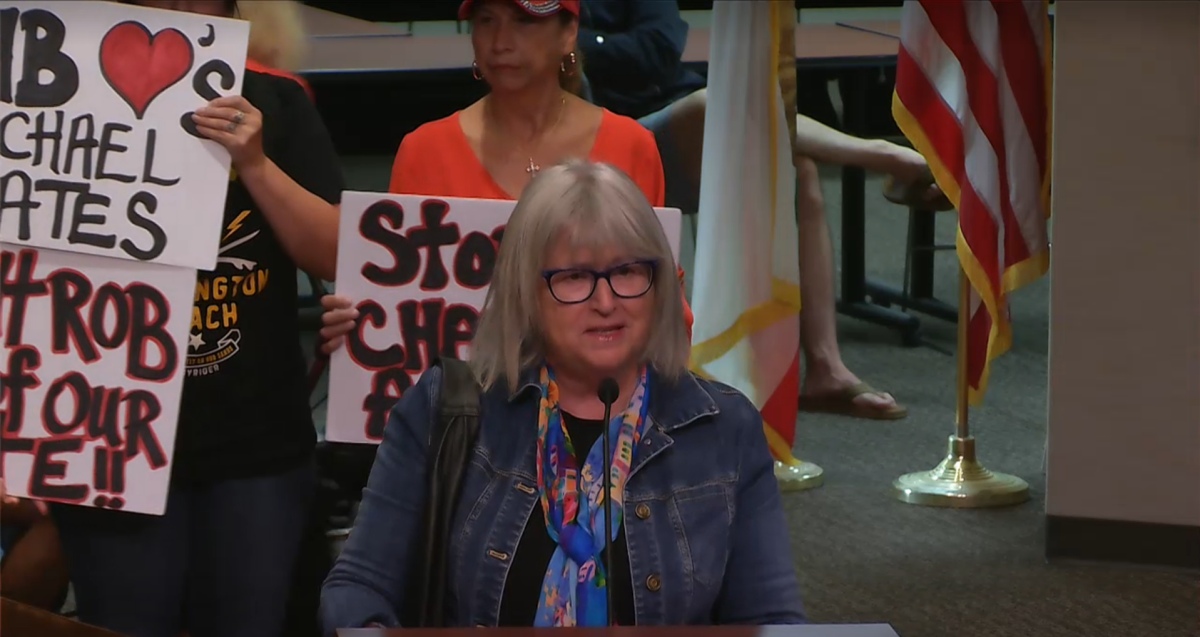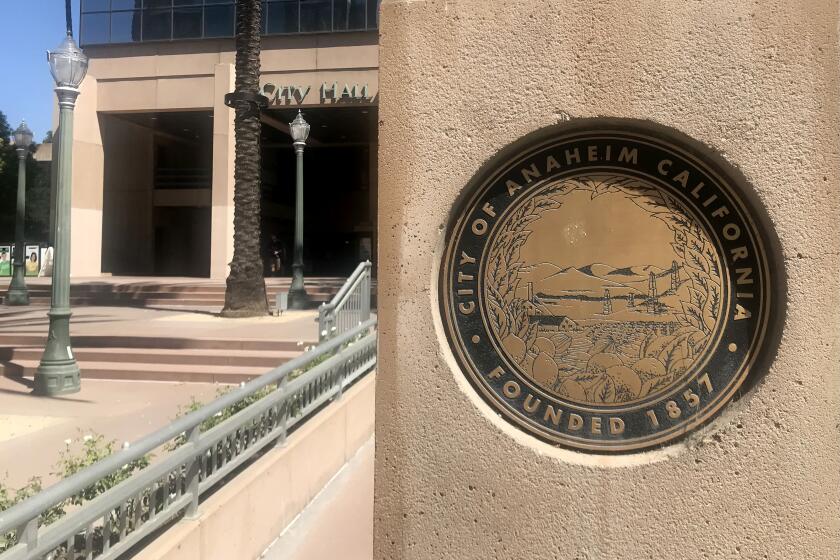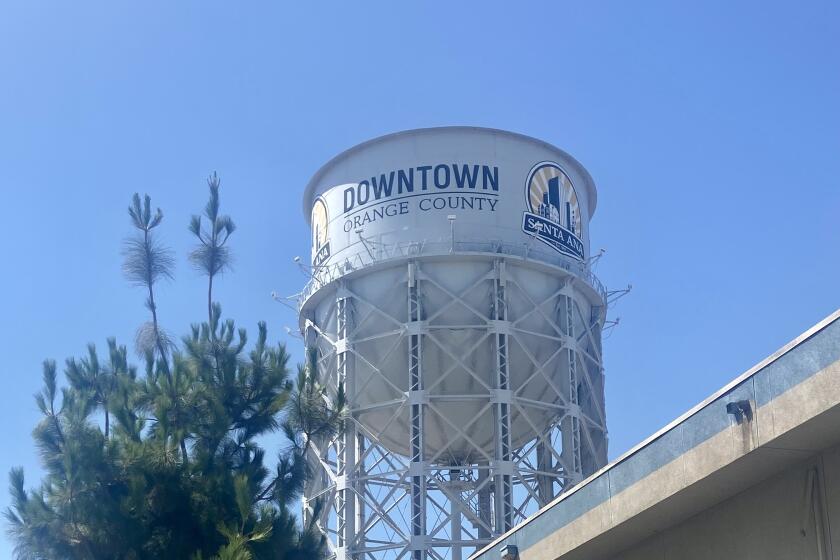Huntington Beach approves four possible charter amendments for November general ballot

Huntington Beach voters will be asked to decide four ballot measures related to their city’s charter this November, following action taken this week by the City Council.
However, an ad hoc committee’s controversial recommendation that the city attorney’s seat should no longer be an elected position is not among the charter amendments to be weighed by residents.
Instead, the City Council — minus Councilman Erik Peterson, who was absent from Tuesday night’s meeting — agreed unanimously to approve two measures that would update existing language in the charter and qualifications for the roles of city attorney, as well for the city clerk and treasurer.
The panel also approved two related ballot measures, one to convert the roles of city clerk and treasurer to become appointed positions and one to clarify the existing duties of the city attorney.
The latter ballot measure states that the City Council would have the authority to employ other attorneys if there is a conflict of interest.
City staff will return to the dais with the ballot measure language for the council’s review before the Aug. 12 deadline to submit all such materials for the November election to the county.
The city first adopted its charter, a living document, in the 1930s. It has been amended at least 16 times since, often to reflect changing priorities, according to City Manager Catherine Jun.
All charter amendments must be approved by majority of Huntington Beach’s electorate, and the City Council is required to determine whether or not to convene a charter revision committee once every decade, Jun said.
The charter was last updated in 2010.
Council members have a month left to appoint an interim mayor following Harry Sidhu’s resignation in May.
This spring, 18 recommendations were proposed by the charter amendment committee, which was formed in August last year. That number was pared down to 13 items recommended by city staff Tuesday night. An additional five, proposed by members of the City Council, were also discussed. Jun said that in preparing the measures that city staff grouped similar suggestions together into two ballot measures.
Debate on the issue of whether or not to move the city attorney position to one that’s appointed by the City Council rather than elected by the populace has gone on for months now. Residents have shown up regularly to the council sessions to voice their support of current City Atty. Michael Gates, who was elected to his position in 2014 and ran for reelection uncontested.
Gates and the City Council have publicly clashed in the past.
In December, Mayor Barbara Delgleize, Mayor Pro Tem Mike Posey and Councilman Dan Kalmick introduced an item that, if approved, would have allowed the council to select and procure legal services of an outside firm that would report to and support the panel.
In response, Gates wrote a four-page letter objecting to the item, which was tabled and moved to a closed session in January.
Gates said earlier this month the matter was not an active issue.
Dozens took to the microphone Tuesday night in support of Gates, some carrying signs, as state Assemblywoman Janet Nguyen (R-Huntington Beach) honored Gates for his service to the city.
Resident Casey McKeon said he did not believe council members would vote for a proposed amendment to make the city clerk, treasurer or attorney appointed positions. Instead, he maintained the council was using “legalese” that would allow sitting council members to seek outside legal help beyond Gates’ purview as the city attorney.
“This legalese language will nullify the elected city attorney and render him appointed. In fact, the council’s created an entirely new section — 310 — in the charter that nullifies the elected city attorney position,” said McKeon, who was part of the city’s charter committee. “... This allows them to circumvent the elected city attorney, who we vote for office.”
Motivated by the corruption scandal in Anaheim, Santa Ana officials are weighing an ordinance that would require tracking paid lobbyists in the city.
In a draft charter revision, the section describes the attorney-client relationship between the city attorney and City Council.
McKeon pointed to language in the proposed new section that states “The City Council may direct the city attorney to contract with other attorneys to take charge of any prosecution, litigation or other legal matter or business” if it is requested by the city attorney; if there is a conflict of interest; if it requires specialized legal advice; or if the matter should involve the city attorney, their office or staff.
McKeon said what was put forward on the council’s agenda Tuesday night was drastically different than what the charter committee recommended.
Other residents offered similar sentiments, arguing that the proposed amendments to the charter would take away their input at the polls.
“We hear the voters that were here, but City Council meetings sometimes are filled with a lot of irony and what I mean by that is that there’s a demand from those that were here that they want to preserve their right to vote for their city clerk, attorney and treasurer,” said Mayor Pro Tem Mike Posey. “There’s also a demand from those that were here that they didn’t want to vote for charter amendments.
“There’s also demand from the voters that we honor the charter, which we did with the appointment process and we’re fixing what might be wrong with that. What we’re trying to do is recognize what the voters have asked for, which is to look at the charter every 10 years because you asked for that 10 years ago and that’s what we’re doing with modernizing the language and a few other things.”
Posey noted that the 10-year review was a maximum, adding that it didn’t preclude a new council majority from deciding to change “something that they didn’t like that the voters voted for. They could go back to the voters in 2024 for changes or reversal of changes. That’s what makes the charter a living, breathing document that is subject to change, but only by the approval of the voters.”
All the latest on Orange County from Orange County.
Get our free TimesOC newsletter.
You may occasionally receive promotional content from the Daily Pilot.






